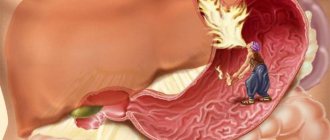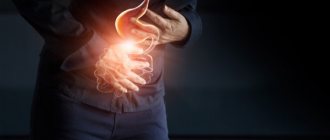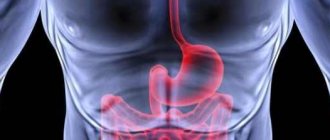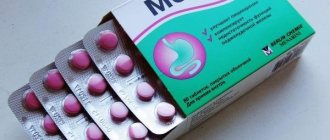How to relieve pain
Gastritis is a complex disease with numerous unpleasant symptoms.
To completely get rid of stomach pain, you need to undergo full treatment. A complex of medications with different mechanisms of action is used. The main task is to relieve painful symptoms, stop inflammation, and eliminate the influence of negative factors. Strategic measures to relieve pain:
- Diet. It is necessary to relieve the digestive tract and allow the muscles to relax. On the first day of an exacerbation, you are allowed to eat nothing and drink more non-carbonated mineral water or spring water. From the second day, introduce fermented milk products, liquid porridges from rice, buckwheat, and oatmeal into the diet.
- Rest. Ensure proper sleep, do not engage in heavy physical labor, and postpone household chores for a few days. Do not bend over or lift heavy objects. To calm the nervous system and prevent muscle spasms, take tincture of valerian, motherwort, glod or special teas.
- Massage. It is necessary to massage the sternum area with light movements in a circle in a clockwise direction. This promotes better digestion, movement of food, relieves pain, and also normalizes blood circulation.
- Medicines. At the first sign of pain, you need to take any antacid drug. The product coats the walls of the stomach, normalizes the level of gastric juice, eliminates the effect of negative factors, and eliminates pain. If the sensations are cramping in nature, you should take an antispasmodic. For gastritis, No-Shpa, Drotaverine, Papaverine are recommended. For acute pain, it is advisable to take painkillers.
- Folk remedies. Traditional medicine drugs act in different directions - they coat the walls of the stomach, relieve pain, soothe, improve digestion, strengthen, heal, normalize acidity levels, and increase protective properties. It can be used as a stand-alone treatment or in combination with professional medications.
You can cope with pain at home on your own; if this sensation occurs for the first time, you need to undergo an examination to determine the cause and nature of the disease.
Pain as the main symptom of gastritis
Gastritis pain is one of the main symptoms along with heartburn and nausea. But pain in the abdomen can be a sign of other functional and organic pathologies of the gastrointestinal tract. How to distinguish the manifestations of gastritis from signs of other diseases? Let us consider in more detail the nature and localization of pain syndrome in chronic gastritis.
Nature of pain
By what pain predominates with gastritis of the stomach, you can approximately determine the nature of the inflammation.
Autoimmune gastritis (type A)
With autoimmune inflammation, atrophy of the mucous membrane occurs, resulting in a decrease in the acidity of gastric juice. This form of the disease is characterized by dull, arching pain that occurs after eating. They are often accompanied by belching of eaten food with an unpleasant, sometimes putrid odor. Also observed:
- diarrhea,
- flatulence,
- poor appetite
- aversion to certain foods (especially protein foods – meat, legumes),
- nausea and vomiting.
We described in more detail about the manifestations of this type of gastritis, the mechanism of development of the pathological process and treatment methods in the article: Existing features of autoimmune gastritis.
Helicobacter gastritis (type B)
Gastritis caused by Helicobacter pylori often occurs with increased acid-forming function as a result of mucosal hypertrophy. The pain with Helicobacter pylori gastritis is dull, aching, sometimes stabbing or cramping in nature. During exacerbations, spastic pain sensations appear along the intestines. At the same time, the patient may be bothered by:
- heartburn,
- bad taste in the mouth,
- sour belching,
- nausea and vomiting after eating,
- constipation
Why does nausea occur with gastritis and what to do about it?
Reflux gastritis (type C)
Reactive inflammation of the gastric mucosa is caused by the reverse reflux of bile from the duodenum into the stomach. Typically, with this disease, pain does not occur immediately after eating, but after 1-1.5 hours, as well as at night (the so-called “hunger” and night pain). Painful sensations are often accompanied by nausea, bitter belching, metallic taste in the mouth, and vomiting of bile.
Localization and time of onset of pain
The next important diagnostic sign is the localization of sensations. So where does gastritis hurt? A typical place of pain is the epigastric region, or epigastrium. The stomach is located in the left hypochondrium, so patients often complain of pain in this area or under the xiphoid process.
Our readers recommend!
For the prevention and treatment of diseases of the gastrointestinal tract, our readers recommend Monastic tea. This is a unique product that includes 9 medicinal herbs useful for digestion, which not only complement, but also enhance each other’s actions. Monastery tea will not only eliminate all symptoms of gastrointestinal and digestive diseases, but will also permanently eliminate the cause of its occurrence. Doctors' opinion. »
As for the time of onset of pain, they most often occur during the period of exacerbation of gastritis. The pain occurs immediately after eating, but can continue throughout the day. With chronic gastritis, symptoms last for several days or weeks, depending on the duration of the exacerbation.
Important: do not try to diagnose yourself, much less prescribe treatment for yourself. If you experience abdominal pain, be sure to consult a doctor.
Headache
Headache with gastritis is caused by intoxication or reflex effects
Headache with gastritis is often caused by reflex effects.
If the disease is accompanied by constipation, toxic gases (skatole, indole) are absorbed in the intestines, which negatively affect the nervous system. That is, endogenous intoxication of the body occurs, which is manifested by headaches, insomnia or drowsiness, irritability, general weakness and fatigue.
Treatment of pain syndrome
How to relieve pain from gastritis is a burning question for those who have at least once experienced the symptoms of this disease. If a painful attack finds you outside the home (at work, on the road), then the best way to get rid of the discomfort is to drink an antacid. At the pharmacy you can buy antacids that are already packaged in disposable bags. It is very convenient to have such medicines at your fingertips.
If it is not possible to take an antacid, you can try drinking a glass of milk or a soda solution (1 teaspoon of baking soda per glass of warm water). Spastic and cramping pain can be eliminated with the help of antispasmodics such as no-shpa, chamomile decoction or valerian preparations. You can also buy a gastric mixture (No. 1 - for hypoacid gastritis, No. 2 - for hyperacid gastritis, No. 3 - for constipation associated with high acidity). Since the stomach hurts with gastritis mainly after eating, it is better to drink herbal infusions and antacids after meals or shortly before them.
Important: before using any medications, you should consult a doctor, because certain diseases require an individual approach.
Chamomile tea soothes the mucous membrane, reduces inflammation in the stomach and relieves intestinal cramps
Severe pain can sometimes be relieved by injection of an antispasmodic. If you feel pain and heaviness in your stomach after eating, enzyme preparations will help get rid of these symptoms (only with reduced acidity). For almost all types of gastritis, prokinetics relieve pain well - these drugs normalize the motility of the digestive tract.
But perhaps it would be more correct to treat not the effect, but the cause? We recommend reading the story of Galina Savina, how she cured her stomach. Read the article
Traditional medicine against stomach pain
Traditional medicine methods are also effective
Traditional medicine should never be used as the only method of treating gastritis pain. Despite the environmental friendliness of such drugs, the almost complete absence of side effects, they serve only as an addition to the treatment and diet prescribed by the doctor.
Plantain juice has a very effective effect on the cause of pain. Instead of juice, you can use an infusion of dried leaves of this plant; it also relieves spasms and heals the inflamed mucous membrane. Sea buckthorn juice, drunk an hour before meals, has a similar effect.
Chewing a small piece of propolis (no more than 8 g for the whole day) for a long time will reduce the severity of pain. The use of folk remedies is not recommended in the acute period of the disease.
By selecting medications from various pharmaceutical groups, you can effectively neutralize painful sensations of various etiologies that occur with gastritis.
The following video will introduce you to folk remedies against gastritis:
Read the article carefully.
An attack of gastritis in most cases is accompanied by severe pain, which negatively affects the patient’s well-being and quality of life, deprives him of his ability to work, and in severe cases, even the ability to move.
Proper treatment, diet and compliance with all doctor’s instructions allows you to achieve stable remission, which eliminates the risk of severe pain in the epigastric region. But if the pain is already tormenting a person, it needs to be relieved with the help of special medications.
Let's figure out which painkillers are effective for gastritis, whether they can be replaced with traditional medicine, how exactly different groups of drugs work, and how to choose treatment depending on the level of acidity of gastric juice.
Questions and answers on: tablets for stomach pain with gastritis
Hello. I am 29 years old. I have had stomach pain for about 10 years now, (it will hurt, it will go away), due to lack of diet. Usually it was enough to drink broth or tea and lie curled up in a ball, and everything would go away on its own. And the pain only occurred when I didn’t eat for a long time. During these years a number of surveys were made (see below). I also took courses of treatment since 2007 (Omoprazole, later Lansoprazole) and the pain went away on its own. But since February of this year, while taking Lansoprazole, the pain became constant, and I was prescribed Nexium, I took it for 1.5 months, 2 tablets a day, 40 mgx2, no effect. I stopped drinking, the pain began to appear less often, but it is still there. I left work because I can’t work with the pain (not very strong, I can tolerate it):
2002 gastritis reflux, cholecystitis (giardia), low acidity (the only analysis done in Russia, then I left and the examinations were carried out in Portugal).
2007 aphthoid erosion of the antrum of the stomach, pylori bacteria (01/3+), bulbitis, foveal reactive hyperplasia foci, incompetent cardia 42 cm from (dental arcade. translated from Portuguese, not sure which is correct), gastritis
2008 a large amount of bile in the gastric cavity (the pylori bacterium was not found this time, as I was treated with antibiotics)
2010 1st degree esophagitis, non-continental/incompetent caridea, inactive chronic gastritis, without atrophy, intestinal metaplasia and dysplasia, foveal hyperplasia. (I saw a photo, in the picture the stomach looks like it has pimples)
0. Now I want to resume examinations again, but I don’t know what needs to be done? What additional tests should I take to determine the diagnosis? 1. I was scared by hyperplasia: why is reactive foveolar hyperplasia dangerous? 2. Is hyperplasia a consequence of gastritis and its complication? So this is secondary? 3. Can such hyperplasia disappear with adequate treatment? 4. Can hyperplasia degenerate into metaplasia, etc.? 5. Which of the diseases I listed above can cause hyperplasia? 6. How often can you do a gastroscopy with a biopsy (after all, tearing off pieces of tissue every year, or even 2 times a year is no joke)? 7. I abruptly stopped treatment with Omoprazole, Lansoprazole and Nexium, but now I found out that this is not possible, what could this mean?
I am really looking forward to your response, and I hope that you will respond. Thanks in advance.
Treatment of gastritis can only be effective in the case of complex therapy with drugs with different mechanisms of action and strict adherence to the prescribed diet.
If you systematically do not pay attention to the discomfort in the stomach, then you can wait for inflammation of the mucous membrane and a diagnosis of “gastritis”. But you can’t ignore it: the pain can be very severe. It is necessary to eliminate its causes.
Pancreatic steatorrhea is a syndrome that develops when more than 7 g of neutral fat taken with food is excreted in the feces per day.
Functional dyspepsia (FD) is understood as a complex of functional digestive disorders that lasts more than three months, including pain or discomfort in the epigastric region.
A look at the problem In 25-40% of patients who have undergone cholecystectomy, abdominal pain and dyspeptic disorders that require correction persist or recur after some time. This condition is referred to as postcholecystectomy.
The World Health Association estimates that there are 2 billion people worldwide with liver disease. At the same time, over the past 20 years there has been a clear trend towards an increase in the prevalence of this pathology.
The Nobel Prize in Physiology or Medicine in 2005 was awarded to two Australian doctors - gastroenterologist Barry Marshall and pathologist Robin Warren - for the discovery of Helicobacter pylori and its role in gastritis and peptic ulcers.
Inflammatory diseases of the pancreas (P) - pancreatitis - is an urgent problem of modern gastroenterology and surgery. The incidence of chronic pancreatitis (CP) among the population of developed countries ranges from 0.2 to 0.68%.
Currently, in gastroenterological practice it is customary to distinguish a large group of diseases with different etiologies.
What do the symptoms look like?
We will tell you what to do if gastritis worsens, rush to the hospital or try to relieve the attack yourself.
An urgent visit to a gastroenterologist is required if:
- pain appeared in the left hypochondrium;
- signs of intoxication are felt;
- loss of appetite, loss of weight;
- Nausea or vomiting occurs;
- your mouth feels dry, has a bad taste, or has excessive salivation;
- heartburn, belching are observed, the intestines are often swollen;
- constipation and (or) diarrhea began;
- blood was noticed in the stool.
Aggravated gastritis is distinguished by the individuality of symptoms. The relapse begins in different ways: the first patient has a rapid attack immediately after eating, the second suffers from pain on an empty stomach. In some patients, time passes after eating before pain appears.
In terms of time, the exacerbation process is usually rapid, developing in a matter of days, sometimes even hours.
It is not advisable to self-medicate; unauthorized treatment can lead to complications; it is better to immediately seek medical help.
Painkillers for headaches
A headache can occur quite suddenly even in a healthy person and cause a lot of trouble. Discomfortable sensations interfere with thinking, working and relaxing, and sometimes can completely disrupt all plans. Frequent and severe pain is usually a manifestation of serious illness. Therefore, you should not take this problem too lightly.
Head pain can occur for various reasons. Doctors distinguish between primary and secondary headaches. Primary ones are caused by the presence of a problem directly in the head, and secondary ones are a manifestation of other diseases of the body.
Headache can be different.
Headache classification:
- episodic, caused by external factors,
- tension headache,
- post-traumatic head pain,
- secondary headaches (with hypertension, intoxication, infections, diseases of the sinuses and teeth),
- facial neuralgia and neuropathy,
- migraine.
Each type of headache requires its own approach to treatment. Incorrectly chosen medications will not only not help get rid of discomfort, but can also significantly harm your health.
User comments
(function(w, d, n, s, t) { w = w || []; w.push(function() { Ya.Context.AdvManager.render({ blockId: 'RA-214620-6', renderTo : 'yandex_rtb_R-A-214620-6', async: true }); }); t = d.getElementsByTagName('script'); s = d.createElement('script'); s.type = 'text/javascript '; s.src = '//an.yandex.ru/system/context.js'; s.async = true; t.parentNode.insertBefore(s, t); })(this, this.document, 'yandexContextAsyncCallbacks ');»+»ipt>
(function(w, d, n, s, t) { w = w || []; w.push(function() { Ya.Context.AdvManager.render({ blockId: 'RA-214620-5', renderTo : 'yandex_rtb_R-A-214620-5', async: true }); }); t = d.getElementsByTagName('script'); s = d.createElement('script'); s.type = 'text/javascript '; s.src = '//an.yandex.ru/system/context.js'; s.async = true; t.parentNode.insertBefore(s, t); })(this, this.document, 'yandexContextAsyncCallbacks ');»+»ipt>
“+”ipt>(adsbygoogle = window.adsbygoogle || []).push({});”+”ipt>
The best remedy for headaches
Tension cephalgia is often treated using non-steroidal anti-inflammatory drugs (NSAIDs). They may be more effective in such situations, since these headache medications are designed not only to relieve headaches, but also to localize inflammatory processes. The latter can cause cephalgia.
The most famous representative from the above group is aspirin, that is, acetylsalicylic acid. Headache is treated with indomethacin and analgin using adequate doses of NSAIDs. This list includes medications that are harmless only for people with a healthy stomach.
Patients with stomach problems, that is, those suffering from gastritis or peptic ulcers, can only worsen their health by taking NSAIDs. The presence of organic acids contained in such medications negatively affects the digestive tract. Even a healthy person is recommended to take tablets after meals for headaches.
It should be noted that the use of the above-mentioned drugs in the form in which they were originally is becoming a thing of the past, since their systemic effect on the body can cause side effects associated with adverse effects on the functioning of the gastrointestinal tract. At the same time, they are the basis for modern medicines that have replaced the old ones. For example, doctors consider the above-mentioned drug Imet (Germany) to be safe and quite effective. The effect of the drug can take up to 10 minutes and lasts up to 8 hours.
https://youtube.com/watch?v=ci_oJJ7Z3e8
Recently, drugs such as ketanov, nise, ketarol have appeared on the list of NSAIDs, which can eliminate headaches and cure an inflammatory process or injury that can affect various organs.
Recently, tablets such as Panadol, paracetamol, upsarin upsa, efferalgan upsa, which help relieve attacks of pain in the head, have become increasingly popular.
This can be achieved by taking a pill and relaxing and resting. The advantage of NSAIDs is associated with their production in special pediatric doses or forms. These can be syrups that the child will agree to drink without any problems. It will be more problematic if you decide to use drops. Headache suppositories are also safe for children. Adults can also feel the effects of such drugs.
https://youtube.com/watch?v=fqrd698mASA
As a rule, the cure for headaches is not only analgesics. Treatment of cephalgia with low blood pressure requires rest and sleep, daily bathing and emptying of the stomach, general massage, and adherence to a dairy-vegetable diet. It is necessary to quit smoking and avoid drinking alcoholic beverages. If you have a severe headache, when your body temperature reaches 37.2°C or more, you should not take the pills yourself, but rather call a doctor at home.
Pain always comes uninvited, and our task is to help get rid of it. The reasons for its appearance are very diverse and headaches can occur in different ways. All the nuances need to be known and taken into account so as not to make mistakes when purchasing medications. When communicating with a pharmacist or pharmacist, you can hear a large list of painkillers for headaches, and the list is confusing. But this is only at first glance. The same chemicals or combinations of them may have different trade names. The classification is not that complicated, and once you understand the main thing, helping yourself will become much easier.
Gastritis, dizziness. Who collided?
Victoria Irkhina Master (1668), closed 2 years ago
Good evening! Please tell me. I had an exacerbation of gastritis, I was bothered by pain in the abdomen just below the solar plexus, belching air, bloating and insanely strong dizziness. I turned to a specialist in Volgograd. I was diagnosed with erosive antrum gastritis, erosive bulbitis and the presence of Helicobacter +++ bacteria. Treatment was prescribed - Sanpraz, Ganaton, Klacid. The pain was almost gone the next day. I'm on a diet. The dizziness became less, but did not disappear. I often get tired and feel drowsy. The doctor said that this cannot happen with gastritis. Then which doctor should I see?
Sofye Master (2449) 2 years ago
do a blood test, perhaps low hemoglobin levels, little iron in the blood, lack of vitamins, you have slight anemia, fatigue is a common symptom with it, measure your blood pressure, with low pressure, hypotension can happen. and don’t worry about it, many people have faced the problem of exacerbation of gastritis, it has become easier, let your body come to its senses. After additional tests it will be clear. There is little that can be gleaned from your history. Sometimes this happens with hypotension and large consumption of canned carbonated drinks, especially Medzhik, Red Bull and so on, the blood becomes thicker, the blood cells stick together, the body experiences a lack of oxygen, and the whole body suffers. Right now, you need diet, rest and good nutrition. exclude all industrially produced drinks.
Victoria Leontyeva Master (1168) 2 years ago
Perhaps these are side effects of the drugs you are taking
Anton Velikanov Artificial Intelligence (132406) 2 years ago
This is quite possible if gastritis has already reached its next stage - duodenal or gastric ulcer. There, during an exacerbation, weakness and dizziness are normal.
Oleg the Wise (12832) 2 years ago
Attention, treat Helicobacter always, for many years. Don't be afraid of drowsiness - they don't die. But follow the diet. Get checked at least once a year. The ulcer is always ready.
gt;gt;SLSlt;lt; Oracle (55724) 2 years ago
The doctor is ignorant, just with duodenitis (bulbitis) this is a fairly common symptom. up to headaches, like a migraine.
Painkillers
Almagel A is also used, which contains aluminum hydroxide, which can neutralize hydrochloric acid in gastric juice
For gastritis, the following painkillers and tablets are used:
- Antacids and enveloping drugs are used for pain relief and healing. This method is suitable for patients with high acidity. Calcium carbonate is used at the rate of 1 gram of the drug per dose. Almagel A is also used, which contains aluminum hydroxide, which can neutralize hydrochloric acid in gastric juice. For severe pain, Atropine, Platifilin and Metacin are prescribed. These drugs are classified as peripheral anticholinergics.
- Antispasmodics. Appropriate as painkillers for gastritis with reduced secretion. Drugs such as Baralgin and No-shpa in tablets or intramuscularly are widely used. The dosage is determined depending on the patient's medical history.
- In the most severe cases, the use of narcotic analgesics is permissible. Their use should be carried out only in a hospital and under the supervision of a doctor. Promedol and Morphine effectively relieve pain. Non-narcotic analgesics are rarely used and only as prescribed by a doctor, as they have a detrimental effect on the mucous membranes of the digestive organs.
Traditional medicine (teas, infusions)
There are a large number of folk remedies that can alleviate gastritis.
In cases where acidification is delayed, apply:
- Plantain juice has a good effect. To prepare it, you need to grind the fresh leaves of the plant and pass it through a meat grinder or juicer. A blender will also work. The juice is taken before meals, one tablespoon at a time.
- Cabbage juice is also used for low acidity. Prepare it in the same way and take 3 tablespoons before meals.
- Lettuce juice.
- Laminal. This is a biologically active food supplement that accelerates healing and normalizes the acid-base balance of the stomach.
- Licorice root infusion. Dry roots are ground (2 tablespoons) and poured with a glass of boiling water. After infusing licorice for several hours, you can take 1/4 cup immediately after meals.
Plantain juice has a good effect. To prepare it, you need to grind fresh leaves of the plant and pass through a meat grinder or juicer.
For high acidity use:
- Potato juice. It is obtained by pressing and is drunk only fresh. You need to drink half a glass of juice 30 minutes before meals for one and a half weeks.
- Sea buckthorn oil. It has a healing and anti-inflammatory effect. It should be taken a teaspoon 2-3 times a day for a month.
- A decoction of flax seeds. To prepare it you need 2 tablespoons of seeds. They need to be poured with a glass of boiling water and left for 10 hours. The prepared decoction is taken during the day before meals.
- Decoction of rose hips. The fruits must be boiled for 5-7 minutes and the broth allowed to cool and brew. The drink is taken one glass three times a day before meals.
- A decoction of chamomile flowers. The flowers must be poured with boiling water and left overnight.
Take 1/2 cup of decoction before each meal.
Many traditional medicines have a positive and long-lasting effect. But to avoid unpleasant consequences, it is better to consult a specialist before using each of them.
Attack of chronic gastritis
The chronic form of the disease is accompanied by pain that is already well known to the patient in terms of intensity and severity. Most often, people end up in hospitals with attacks of chronic gastritis in the fall or spring, which has its own natural reasons. In the spring, after a long absence of natural vitamins, even a small handful of fresh berries can cause severe spasmodic pain. As for the autumn period, there is an anxious period at the end of October-November - the time of rains and mental stress.
Unlike an acute attack, an exacerbation of a chronic one is often protracted and can manifest itself either 10-15 minutes after crossing the dietary limits, or several hours later. The increase in symptoms also extends over a long period and is expressed, first of all, in severe weakness and sweating, dizziness, then nausea and severe vomiting. Normally, an increase in body temperature should not be observed during a chronic attack of gastritis.
Astheno-vegetative syndrome
Astheno-vegetative syndrome appears only in the chronic form of gastritis, as well as in other chronic diseases. It is formed due to the participation of immune mechanisms, the central nervous system, and regular stressful situations, which subsequently cause chronic disease. The difference from reflex pain in this syndrome is that pain in the head occurs regardless of whether the patient has taken food.
The nature of the pain in this case is not constant. They often intensify at night or with heavy stress on the body. In addition, additional symptoms appear in the form of weakness, fatigue, apathy, and dizziness at the end of a hard day. However, nausea and characteristic stomach upsets are observed quite rarely here.
Due to headaches with gastritis, it is enough to establish an accurate diagnosis, since this symptom is inherent in almost all diseases and it is not always possible to determine the cause of the pain the first time. A feeling of nausea can also occur after headaches, as a consequence of untimely treatment. Medicines aimed directly at relieving headaches will not help as effectively as expected.
How to get rid of headaches with gastritis
There are simple ways to get rid of the ailment: put white cabbage leaves on your forehead. Just lie down a little and the pain will disappear. In 30 min. Dill oil helps get rid of ailments. It should be applied to the forehead and temples.
Traditional analgin can help you get rid of headaches with gastritis. But this will not solve the problem, since the cause of the malaise is gastritis. Therefore, if discomfort occurs, it is recommended to take an antacid. Drinking herbal teas and valerian infusion before meals gives good results. To eliminate spasms, “No-spa” is recommended.
It is important to pay attention to the overall picture of digestion. If the inflammatory process is accompanied by constipation, then toxins enter the blood from the intestines, which negatively affect the state of the nervous system.
To solve the problem of headaches arising from gastritis, you need to treat the disease itself
Developed intoxication is accompanied by headaches, which are difficult to relieve with medication without eliminating the cause. In this case, the person complains of sleep disturbances, fatigue, and irritability.
Any painkiller will relieve the symptom for a short time, but the main problem will remain. To solve the problem of headaches that occur against the background of gastritis, you need to treat the disease itself
It is important for the patient to follow a diet, quit smoking and alcohol, and avoid stress. If inflammation worsens, physical activity should be limited.
There may be several reasons why a headache occurs with gastritis: reflex pain, manifestation of astheno-vegetative syndrome, intoxication due to disruption of the gastrointestinal tract or improper use of medications.
Gastritis is usually associated with stomach pain and nausea, especially on an empty stomach; the patient cannot eat salty, spicy or fried foods. But some of its symptoms may not be directly related to the gastrointestinal tract and food intake. For example, the fact that gastritis can cause a headache is not obvious at first glance. But, nevertheless, headaches, dizziness and nausea with gastritis occur quite often.
- https://netmigraine.com/golovnaya-bol-pri-gastrite-prichiny-lechenie/
- https://gastritinform.ru/zdorovayagolova.ru/iz-za-chego-mozhet-bolet-golova/mozhet-bolet-golova-pri-gastrite.html
- https://sputnik.by/society/20171230/1032790433/prosto-o-zdorove-kak-ponyat-ot-chego-bolit-golova.html
- https://kiwka.ru/gastrit/golovnaya-bol.html
- https://zdorovajagolova.ru/lechenie/obezbolivayushhie-ot-golovnoy-boli/ot-golovnoj-boli-pri-gastrite.html
Post Views: 8,161
Why does dizziness occur with gastritis?
Dizziness is a feeling of a violation of the body's position in space
As for gastritis, dizziness and headaches are a common consequence of this disease. At first glance, the symptoms are not related to each other, but when severe stomach pain occurs, the entire body suffers, including the head.
Depression, anxiety, chronic fatigue will invariably affect the state of the entire autonomic system. Gastritis, weakness and dizziness are a galaxy that occurs both in those who have just contracted gastritis and in those who have been struggling with the disease for many years.
Read more about the causes of dizziness with gastritis here.
What is dizziness
Dizziness is a feeling of disturbance in the position of the body in space. There are more than eighty causes of dizziness, so determining why you feel dizzy is not an easy task.
Most often, especially in young people, the reasons are harmless. This may be overwork, motion sickness, hunger, as well as the presence of wax plugs in the ear canal.
But in some cases it can be a sign of a serious illness.
There are 2 types of dizziness:
- systemic (vestibular): apparent rotation of surrounding objects and one’s own body in space. It can be peripheral (damage to the inner ear, vestibular nerve) and central (as a symptom of brain disease: trauma, tumor, hemorrhage);
Dizziness is a feeling of a violation of the body's position in space
- non-systemic : feeling of instability, failure, falling, faintness. It includes lightheadedness, psychogenic dizziness, and imbalance.
Symptomatic treatment of dizziness is possible only after a doctor has determined the cause that caused it and only in parallel with qualified treatment of the underlying disease. As a rule, it includes several components: taking medications, maintaining a daily routine and physical activity, and diet.
Can there be dizziness with gastritis?
Many chronic diseases of internal organs can contribute to the development of non-systemic dizziness. Chronic gastritis with a complicated course also belongs to such ailments.
With severe stomach pain, the body “redirects” impulses to other zones. Therefore, in many diseases, pain radiates (sends) to other organs, sometimes confusing even specialists.
By redistributing pain, the body fights the pain syndrome, forcing the patient to pay attention to his health.
The appearance of frequent dizziness with gastritis usually signals the severity of the disease and the involvement of the whole organism in the disease.
Even knowing about existing gastritis, most patients rarely associate regularly occurring dizziness with this diagnosis.
Without a correct diagnosis and treatment of the underlying disease, it will not be possible to effectively cure dizziness with gastritis.
Only after identifying the underlying illness and eliminating its cause is it possible to fully combat dizziness or headaches in favor of recovery.
Causes of dizziness with gastritis
Systematic dizziness and pain should become an urgent reason for a patient with gastritis to go to the doctor and diagnose the cause of such symptoms.
The most common cause of dizziness is intoxication or poisoning of the body.
Eating unhealthy food, drinking alcoholic beverages, smoking, uncontrolled use of medications - these are all reasons that cause exacerbation of diseases of the digestive system.
Accordingly, during intoxication, harmful ingredients enter not only the stomach, but also the patient’s blood, due to which they are distributed throughout the body.
Against the background of gastritis, nausea occurs, often accompanied by vomiting, malaise, as a result, a headache with frequent dizziness.
Dizziness with gastritis can also occur against the background of the reflex characteristics of gastritis.
Gastritis requires the patient’s special attention to his diet, systematic and timely meals, and frequent meals in small portions.
In the absence of food intake, and, accordingly, the necessary ingredients and vitamins for the body, the level of glucose in the blood may simultaneously decrease, which is very often accompanied by severe dizziness.
Most often, such causes of headaches and dizziness decrease after eating.
Dizziness with gastritis can be due to asthenovegetative syndrome, which often accompanies diseases of the digestive system in a chronic form.
The appearance of dizziness in this case can be explained by the presence of a depressed state, nervous experiences and stress characteristic of chronic gastritis.
Such phenomena negatively affect the functioning of the autonomic and immune systems of the human body and are accompanied by constant overexertion and malaise, with frequent occurrences of dizziness.
If you feel dizzy and nauseous
To determine exactly why you feel sick after eating and feel dizzy, you need to see a doctor so he can prescribe an examination. Evening nausea is a sign of chronic gastrointestinal pathologies - ulcers, gastritis, dyskinesia. In some cases, this symptom may indicate inflammation of appendicitis.
To determine exactly why you feel sick after eating and feel dizzy, you need to see a doctor to schedule an examination.
Dizziness and a number of accompanying symptoms that occur immediately after food indicate the need for rapid digestion. Food enters the stomach in large quantities. The organ simply cannot cope with such a load, and it enters the intestines in the form of chyme.
In this organ, unprocessed food begins to increase osmotic pressure, which, in turn, leads to nausea, weakness, heart rhythm disturbances, and dizziness.
Similar symptoms of early dumping are typical for people who eat small portions of food throughout the day. Dizziness may be accompanied by vomiting and nausea. This leads to food restriction or refusal.
Against this background, the development of serious diseases such as ulcers or gastritis is possible.
Treatment of early-stage dumping syndrome with gastritis is diet. Products for it are selected by the doctor individually for each patient, based on the reasons that caused it. Patients need to reduce their intake of foods that contain fiber. Nuts and baked goods are also contraindicated during the diet.
There is also late dumping syndrome. This stage of the disease is characterized by more severe symptoms. Its main difference from the early stage is the manifestation of dizziness and nausea several hours after eating.
If you eat a large amount of food at one time, late dumping syndrome may be accompanied by nausea and vomiting.
If these cases are periodic, then to determine the cause, it is necessary to contact a specialist.
Dizziness after eating with gastritis
The main cause of dizziness after eating with gastritis is a drop in the amount of blood flowing to the head. After eating, more blood flows to the abdomen to aid the digestion process. When blood enters the digestive system, there is a slight drop in blood pressure, which leads to dizziness.
The greater the amount of food consumed, the higher the chances of experiencing dizziness. And this is why you can feel weak especially after eating a lot of food at once.
The heart must pump more blood to the stomach, which results in relatively less blood flowing to the head, causing dizziness.
In addition, dizziness after eating with gastritis may be a sign of the development of dumping syndrome in patients after extensive gastrectomy.
Dumping syndrome is a condition characterized by an increase in the rate of movement (passage) of food masses from the stomach to the intestines. It often develops after surgery on the stomach (removal of part of the organ), dissection of the main trunk or branches of the vagus nerve. This leads to food being poorly digested.
The greater the amount of food consumed during gastritis, the higher the chances of experiencing dizziness.
Insufficiently digested food masses enter the intestines, which increases the functional load, and blood is redistributed from the upper parts of the body, including the head, to the organs of the digestive system. There are early and late dumping syndromes.
Immediately after eating with dumping syndrome due to gastritis, the following clinical manifestations appear::
- severe weakness, makes you sleepy;
- increased heart rate (tachycardia);
- severe nausea accompanied by vomiting;
- mixed paroxysmal shortness of breath (difficulty breathing and dizziness);
- pale skin, bluish spots may appear on it, which is a sign of hemodynamic disturbances;
- increased sweating.
To prevent the appearance of unpleasant sensations after eating when suffering from gastritis, it is important to adhere to certain dietary recommendations given by your doctor.
Treatment of dizziness after eating
Doctors unanimously say that if you feel dizzy after eating, then these are signals of a malfunction in the body. It is necessary to establish the cause and try to exclude it.
The following methods and drugs are used to treat dizziness:
- medications containing enzymes;
- following a low-fat, high-carbohydrate diet;
- a short rest after eating;
- if eating is accompanied by severe dizziness, it is recommended to take Novocaine before meals;
- in some cases, blood transfusion is recommended.
To prevent dizziness after eating from becoming a constant phenomenon, you need to stop eating unhealthy foods and strict diets, and avoid overeating. Try to stick to your diet and eat at the same time.
Sources:
- https://www.reu.by/studentam/zdorovyj-obraz-zhizni/716-golovokruzhenie-prichiny-pervaya-pomoshch-profilaktika.html
- https://gastritguru.ru/lechenie/golovokruzhenie-pri-gastrite.html
- https://pobedigastrit.ru/lechsimpt/prichiny-golovokruzheniya-pri-gastrite.html
- https://health.mail.ru/consultation/864996/
- https://himeq.ru/pochemu-posle-edy-slabost/
- https://autogear.ru/article/277/305/krujitsya-golova-posle-edyi-prichinyi/
How to choose a medicine
To choose the right drug, you should take into account all the features of cephalgia. The head can get sick with high or low blood pressure, migraines, that is, tension pain, injuries. With sudden cephalalgia caused by migraine, sometimes one side of the head is affected, for example, in the forehead or temporal part.
Triptans help eliminate attacks of cephalalgia, which is of migraine origin. If there is a circulatory disorder in the brain, this is the cause of the disease, along with the process of incorrect transmission of nerve impulses as a result of deviations in the functioning of the nervous system.
The onset of an attack of cephalgia can lead to numbness with simultaneous tingling in the legs and arms, pain in the eyes under the influence of light, increased sensitivity to various odors, nausea, etc. Migraine has no specific treatment because its attack cannot be predicted. The attacks appear suddenly, but they are controlled even if the symptoms have only just been detected. They cannot be prevented, so it is better for those suffering from this type of disease to carry headache pills with them.
If a person has to sit in an uncomfortable position for a long time, then he begins to develop cephalgia. This may be affected by fatigue or stress. In the vessels of the shoulders, starting with the neck muscles, a disruption of blood supply occurs due to spasm. Cephalgia is not characterized by exact localization. A person may experience sensations as if a hoop had bound his head. This may continue for hours or days.
Dizziness after eating: causes, symptoms, treatment
Dizziness is a special condition in which a person may experience loss of balance or blurred vision. Why does dizziness occur after eating and what reasons may contribute to this? Most often, dizziness after eating occurs due to the development or progression of the following diseases:
- dumping syndrome;
- food allergies;
- unbalanced diet;
- anemia;
- hypoglycemia;
- hyperglycemia;
- gastrointestinal diseases.
Dumping syndrome
During its attacks, a person may experience increased blood pressure, headaches and dizziness. This condition is not a separate disease, but it can be quite unpleasant.
The cause of dumping syndrome is the flow of blood to the stomach and pancreas (after eating), which causes the brain to experience oxygen starvation.
After eating, food moves from the stomach to the intestines, which leads to pressure and the release of catecholamine (a special substance that provokes the symptom). Thus, a person suffers from a sudden attack of illness. In order to stop dumping syndrome, you must adhere to the following nutritional rules:
- follow a meal schedule to prevent the development of hunger;
- eat full portions several times a day and do not follow a diet, since after eating there will still be a risk of overeating, which can only aggravate attacks of dizziness;
- minimize the consumption of sweets and starchy foods, as they are difficult to digest;
- Check your blood sugar levels regularly.
Food allergies
The body's reaction to a food product is called food allergy. It can occur after eating various dishes or individual products. It is most often caused by citrus fruits, nuts, honey, chocolate and strawberries.
How to provide first aid at home during an attack of acute gastritis
Attacks of acute gastritis are characterized by an increase in one or all symptoms at once. To alleviate a person’s condition, it is necessary to call a doctor and provide first aid to the patient before his arrival.
It is necessary to put the patient to bed. Fill a heating pad with hot water and place it on the area of pain – this will relieve the pain a little. Give warm water or warm, but not hot tea to drink. If there are special medications that relieve stomach pain and gently coat the walls of the stomach, then they should be given to the patient according to the instructions. Such drugs are, for example, Maalox or De-Nol.
All measures taken only allow you to gain a little time, and do not prevent a serious illness. An attack of acute gastritis is an extremely dangerous condition, in some cases requiring urgent hospitalization of the patient. And the specialist will not only examine and make his diagnosis, but also prescribe the necessary medications.
In case of an acute attack of gastritis, it is necessary to put the patient to bed, fill a heating pad with hot water and place it on the source of pain, so the pain will subside a little
For several days after an attack, the patient needs special care - strict adherence to a diet that involves eating exclusively low-fat soft foods is necessary. Broths and pureed soups, jelly and porridges are good for this. It is best to abstain from eating food altogether for 1-2 days, giving it up in favor of tea and jelly. In addition to special nutrition, it is also necessary to monitor the daily routine, providing the patient with good healthy sleep at least 8 hours a day.
How to provide first aid at home during an attack of acute gastritis for a child
If a child exhibits the same symptoms as an adult, you should immediately call a doctor at home and try to provide first aid yourself.
However, the assistance provided to the child has its own characteristics:
- gastric lavage is done with a solution of 0.5% baking soda, non-carbonated mineral water or clean boiled water;
- a heating pad with warm water is placed on the epigastric region, a warm compress is placed on the stomach;
- The child is advised to drink plenty of warm water, however, during an attack, feeding him is strictly prohibited, this can only aggravate the situation;
- in case of severe pain, you should give an antispasmodic agent - no-shpa (dosage according to instructions) or belladonna tincture (5-10 drops);
- Bed rest after an attack must be observed for 2-3 days, but you can fast only for the first 8-12 hours after the condition worsens.
A child can be hospitalized only in case of a sharp deterioration in the condition - incessant vomiting or severe dehydration. If there is a large loss of fluid, it is urgently necessary to replace it intravenously.
Gastritis causes pain and dizziness
The fact that gastritis can cause a headache is not obvious at first glance. But, nevertheless, headaches, dizziness and nausea with gastritis occur quite often.
Depending on the cause, the headache will vary in nature and may require different medications to relieve it. Painkillers may help in one case, but not provide relief in another. Before taking pills, you need to figure out what is causing your headache.
Reflex headaches with gastritis
This condition can cause hunger pain in the stomach. In a patient with gastritis, when the stomach is empty, gastric juice comes into contact with the inflamed gastric mucosa, causing severe pain in the epigastric region. If food does not enter the stomach, these pains may begin to radiate to neighboring parts of the abdomen.
Reflex pains have several characteristic signs: with gastritis, headache on an empty stomach, especially if there are long breaks between meals
Constant irritation of the vagus nerve, which plays an important role in the irradiation of pain to other areas, can also lead to headaches. These pains have several characteristic signs: a headache on an empty stomach, especially if there are long breaks between meals; Along with the headache, nausea and sometimes the urge to vomit appear.
The patient may become irritable, picky, capricious, he will constantly complain that he has a headache, everything is falling out of his hands, the behavior of others irritates him. All these symptoms are pronounced when he is hungry and recede when the patient is full.
Astheno-vegetative syndrome as a consequence of headaches with gastritis
Unlike reflex pains, with astheno-vegetative syndrome, the headache occurs regardless of food intake; pain often develops in the evening or during heavy exertion.
Sometimes a headache can become the leading symptom of gastritis, which significantly complicates diagnosis - it is very difficult to suspect a stomach disease based on the fact that the patient constantly has a headache. Nausea can develop as a consequence of a headache if it is not relieved for a long time.
The cause of intoxication in gastritis is the incorrect use of medications; the headache often hurts immediately after taking the medication or within half an hour after it.
Headache due to intoxication due to gastritis
Intoxication with gastritis can be caused by various reasons. It is caused by bacterial toxins, primarily Helicobacter (a common cause of gastritis, the only bacterium that can live in the acidic environment of the stomach). Constantly getting into the blood, these substances contribute to the development of astheno-vegetative syndrome and themselves cause poisoning.
As a result, headache, dizziness, nausea, weakness appear, and stool disorders may occur. In such cases, as with asthenic pain, the head hurts constantly, regardless of food intake and time of day, the patient constantly feels unwell, experiences malaise and weakness.
After vomiting, the patient's condition usually improves. A more rare cause of drug intoxication is an allergy to the components of the drug. In this case, the headache is necessarily accompanied by nausea, weakness, skin rashes, swelling, and in rare cases, dangerous manifestations that threaten life.
Why does dizziness occur with gastritis?
The prevalence of gastritis among the adult population is 80%; every second person on Earth is affected by it. The lack of complete treatment of the disease leads to inflammation of neighboring organs, ulcerative processes and the appearance of malignant tumors. Dizziness with gastritis is one of the specific symptoms that occurs in combination with complaints characteristic of the pathology.
The gastric mucosa is normal and with gastritis
Everyone knows what gastritis is. This is a disruption of the natural process of digesting food due to inflammation in the mucous wall of the stomach. There are acute and chronic phases of the disease. If the course is unfavorable against the background of the underlying disease, the overall resistance of the body decreases, and a disorder of the nervous system occurs.
Symptoms depending on the type of pathology
The acute course with the right approach and competent therapy leaves no consequences. The cause of its development may be previous infectious diseases or poisoning. In this case, the patient is bothered by severe pain, nausea and vomiting.
Chronic gastritis occurs as a complication of the first form. Its symptoms are constantly changing and are caused by long-term damage to the stomach.
The pain syndrome in gastritis is not as pronounced as in acute gastritis; nausea, vomiting, dizziness are observed. The chronic form of the pathology is characterized by periods of exacerbation and remission.
Another breakdown often occurs due to non-compliance with the diet or as a reaction to a stressful situation.
Reasons for development
Based on a set of morphological and topographical characteristics, gastritis is classified in medicine into several types:
- autoimmune type;
- caused by Helicobacter;
- reflux gastritis;
- allergic nature;
- erosive appearance;
- reactive gastritis, etc.
Helicobacter pylori infects the stomach and duodenum
Chronic gastritis is most often associated with Helicobacter Pylori (HP), which causes gastric cancer.
Gastritis is characterized by a combination of several factors that provoke its appearance:
- Disruption of the food process, poor quality of products, deviation from the diet. Snacking on the run and not systematically complicate the process of digesting food.
- Regular and long-term use of medications that have an undesirable effect on the mucous membrane of the organ and change laboratory parameters.
- Untimely sanitation of chronic foci of infection.
- Bad habits: alcohol, nicotine.
- In addition, gastritis can be caused by improper metabolism, obesity, and anemia.
- Inflammatory diseases of the gastrointestinal tract (gastrointestinal tract) are included in a separate group.
Why is it necessary to treat both forms of the disease? Gastritis negatively affects the condition of the body as a whole: as a result of insufficient absorption of nutrients, dysbiosis occurs and their metabolism is disrupted.
Gastritis can be combined with inflammation of the duodenum. Long-term chronic course causes the following complications:
- anemia;
- internal bleeding;
- pancreatitis, cholecystitis, enterocolitis;
- stomach and duodenal ulcers;
- cancer.
Its most dangerous consequences include malignant processes in the gastrointestinal tract.
Differentiation with other diseases and symptoms
Gastritis has a variety of symptoms, so it is necessary to undergo additional examinations before starting treatment to establish an accurate diagnosis.
Diagnosis of the disease includes endoscopy, fibrogastroscopy with taking samples for biopsy.
The latter, despite its invasiveness, is a highly informative method for detecting not only the stages of gastritis, but also its complications. Laboratory methods include serological reactions, detailed and biochemical blood tests.
To differentiate from functional dyspepsia, doctors take into account a number of factors:
- Duration and frequency of symptoms. Gastritis is characterized by a duration of at least 12 weeks throughout the year.
- Endoscopy allows you to determine biliary dyskinesia and exclude organic damage to the gastrointestinal tract.
- Tracing the connection between irritable bowel syndrome and bowel movements.
Clinical picture:
- The disease occurs with low and high acidity. When elevated, heartburn and sour belching occur; Low acidity causes rotten burps. Using these specific signs, you can determine the acid-base environment of the stomach.
Heartburn is mainly characteristic of patients with gastritis with high acidity
- Pain in the epigastric region will be acute in the primary case and dull, bursting in the chronic course.
- A characteristic difference between gastritis and ulcers or duodenitis will be increased pain after eating.
- Weakness and dizziness occur against the background of severe intoxication, as well as as a vegetative syndrome.
- If it lasts for a long time, polyhypovitaminosis is possible, as a result of which teeth marks remain on the tongue, seizures in the corners of the mouth, peeling of the skin, dryness and brittle hair are observed.
- Loss of appetite and perversion of taste sensations.
- Vitamin deficiency as a result of poor absorption of food.
- Asthenic syndrome, which occurs more often in females.
According to statistical data, in percentage terms, the frequency of occurrence of symptoms is as follows: 70% of patients complain of pain and discomfort in the epigastric region, dyspeptic disorders are observed in 69%. Nausea, vomiting, and belching occur in 100% of cases.
The most characteristic symptom of gastritis is discomfort in the epigastric region
The acute period lasts from 1-3 days. If additional uncharacteristic symptoms occur, it is necessary to exclude an atypical form of myocardial infarction.
Features of the clinical picture in chronic course
The pain is localized near the navel, in the right hypochondrium. Occurs more often after eating, intensifies with severe violation of the diet. She has a dull, whining character. In the morning the patient feels sick and has a bitter taste in the mouth. The combination of symptoms makes a person irritable, and as a result, memory and attention are impaired.
Patients are perplexed by the appearance of headaches and dizziness with gastritis, which are not combined with the main signs of the disease. Indeed, these symptoms are somewhat specific. There are several causes of dizziness with gastritis:
- Consequence of intoxication. In such cases, the temperature rises to 38 ºС, repeated vomiting, diarrhea and increasing weakness develop. In acute cases, dizziness is a signal of complications of the process and the addition of a bacterial infection.
- Asthenovegetative syndrome. Women are more susceptible to it because of their inherent emotionality. In this case, dizziness is accompanied by other vegetative manifestations: chills, irritability, impaired thermoregulation, causeless attacks of nausea, etc.
Asthenic syndrome may develop as a result of chronic gastritis
- Reflex pain occurs due to the spread of pain in the stomach to other organs and systems. Dizziness is caused by headache.
Treatment of the disease
Therapy for gastritis is aimed at eliminating inflammation, restoring intestinal motility, and relieving pain. In each case, the treatment regimen is drawn up by the doctor individually, depending on the type of pathology and the characteristics of the course:
- Treatment includes gastric lavage, the use of laxatives, and enterosorbents.
- Antispasmodic and hyposensitizing drugs are prescribed, including those of plant origin, with normal tolerability of the components.
- In the first three days, the patient is prescribed a fasting diet. In the future, porridge and lean meats are gradually added.
People suffering from gastritis need to follow a diet
After relief of the acute condition, the patient is recommended to improve the quality of life, normalize the work and rest schedule, and daily nutritional monitoring.
Herbal infusions can be used under the supervision of a physician to relieve attacks of nausea and allergic gastritis, but not as the main methods of treatment.
It is prohibited to use traditional medicine without diagnosing the disease. The treatment regimen differs significantly depending on the acidity of the stomach. Uncontrolled treatment can lead to serious complications.











